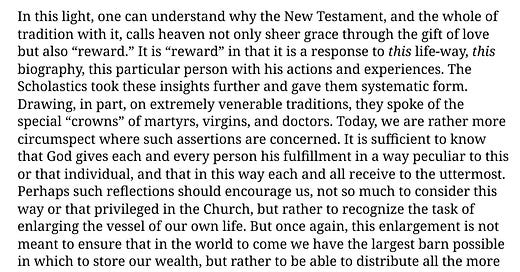Toward a Just Eschatology: Rejecting Disproportional Punishment, Affirming Asymmetric Reward
God rewards us based on - nothing we merit, but - promises He owes Himself. When He goes beyond even those rewards (dayenu-like or "it would have been enough") to "over-reward" some, that should never be misconstrued as God, in any way, "under-provisioning" others.
As it is, both because we are mutually constituted, onto-relationally, and because each realizes the highest of divine rewards precisely in terms of an enhanced capacity to mediate grace as a divine conduit to the Body of Christ, every divine gift to anyone will thus redound to everyone in the Totus Christus.
Of course, any notion of "under-provisioning" would necessarily presuppose a concept of "just-provisioning." This conception often arises in the context of divine punishments, whether retributive and/or restorative.
Any punishments that are prima facie disproportional will give rise to serious proportionality objections because those - not only violate our moral intuitions, parental instincts & aesthetic sensibilities, but - are morally unintelligible, e.g. in ways analogous to how we apply double-effect principles.
Specific examples of unjust punishments, in my view, would include both the eternal conscious torment of any rational being as well as the abandonment of any soul's essential goodness to any everlasting parasitization by evil, i.e. to leave one forever in sin.
Further, consider that our lights of experience & reason (horizontal) & faith (bridging) are modes of union, each having its own sorts of beatitude & rests (stabilities in the good) in relation to the same formal object, God. Also, the light of glory (vertical) will be yet another mode of operatively knowing God. These modes, taken together, are intrinsically telic, theotically successive and integrally sublative (Rahner’s not Hegel’s sublation), i.e. constitutive operations of our dynamical becoming. So, another example of an unjust punishment, as I see it, would include any foreclosure on any rational creature's essential, intrinsic teloi, i.e. to abort any person's dynamical becoming. All persons should remain forever co-self-determined and should perdure eternally in infinite potency to the divine.
The passage, quoted above, appears in the chapter on “Hell, Purgatory, Heaven” in _Eschatology: Death and Eternal Life_ by Joseph Ratzinger. In the English translation, this section begins on page 233.




